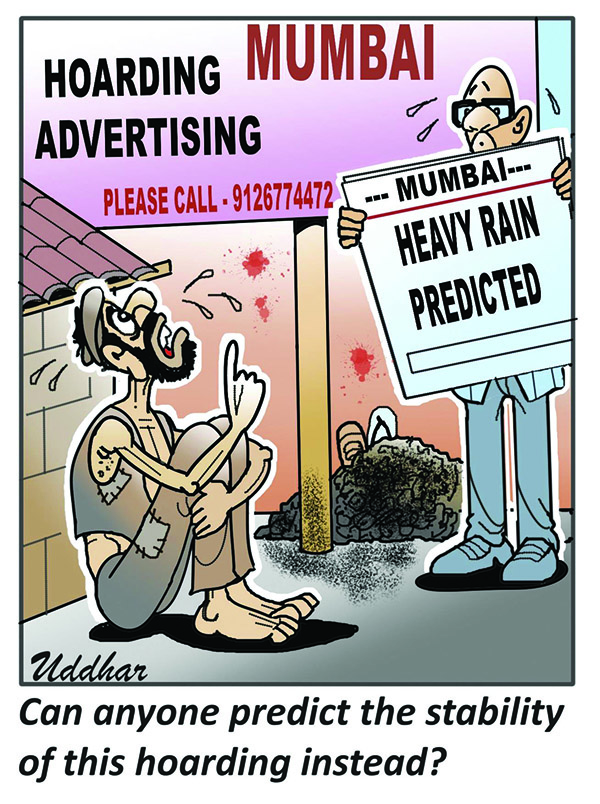20 Jun 2018 | 06:29am IST
Letters to the Editor
A type of pollution that is most common in the world today is plastic pollution. Most of the garbage includes plastic, such as shoppers' bags, plastic bottles, plastic wrappers, disposable cups, spoons and plastic papers. People prefer using disposable items because of the change in their life-style. These disposable items are made up of plastic. And one of the major problems with the plastic is that it is non-degradable.
As plastic contain harmful pollutants, it has the potential to harm our nature and natural resources. It not only causes land pollution and destroys our animals and plants but also cause water and air pollution.
As plastic is cheap and less expensive, it is used everywhere, hence major portion of our garbage contains plastic and when this garbage is burnt, it pollutes the land and the air.
In his address on the occasion of Goa Revolution Day, Chief Minister Manohar Parrikar reaffirmed his commitment towards a plastic-free Goa, although he did not spell out any deadline this time. Several of his previous deadlines in regard to this contentious issue have already passed without achieving much. This challenge of plastic-free Goa cannot be achieved by the Chief Minister or the Government of Goa without the active participation of the local self-governing bodies i.e. Panchayats and Municipal Bodies as well as citizens.
While the Municipalities initially carried out the drive against plastic bags with much gusto, the Margao Municipality failed to arrest the use of plastic bags during the Purumentachem fest. The drains of Margao and its suburbs have already choked with plastic, and while the Municipality cannot exonerate itself for this neglect, the lack of civic sense among citizens is also to be blamed. Many in Goa dump plastic in drains.
To achieve a plastic-free Goa, the alternative has to be provided first. Cloth bags are a good alternative and massive production of such bags by the self help groups (SHGs) under the aegis of the Goa Handicrafts, Rural & Small Scale Industries Development Corporation Limited (GHRSSIDC) can be a welcome step. These bags should be made available at nominal prices and few may initially be distributed free of cost. The Government functions and ceremonies should conspicuously avoid the use of plastic, to provide an emulative example to the citizens. Plastic mineral water bottles should be absent first at government ceremonies.
The Chief Minister is personally very much interested in the plastic free Goa, and he himself never partakes the prasad in temples if the same is served in plastic bags/ bowls. I think that unless plastic-free Goa is achieved, our drains will continue to clog and Sal, St Inez Creek and other rivers and rivulets continue to be polluted.
Do not enter the
sea in monsoons
As we all know that the monsoon season has started. As in the rainy season it is a off season in Goa and foreign tourists do not come in this season because of high current tide and a rough weather condition which is unsafe to enter in the sea or go near the coastal belt.
It is noticed that even in the monsoon season many Indian tourists come to Goa and they know it very well that during rainy season it is unsafe to swim or to enter in the sea water. Many accidents take place on beaches during the monsoon season and many of them loss their life. Although being educated they act like uneducated people.
Right from the beginning of school we learn from our books about all the seasons. When you visit Goa in the rainy season do not go in the coastal areas and enter in the sea, there are many other places you can enjoy your holidays. We the people of Goa feel sad to see that you come here and loss your life on our soil.
Come to Goa safe, enjoy and go to your home safely because your family needs you back home safe as they love you. So remember that your safety is in your own hands. Don't blame others for the wrong you do which your golden memories turn into horrible memories. Do not give a bad name to our Goa. Next time when you come to Goa take care of your self and be safe.
Discount on petrol,
diesel purchase
The Union government post-demonetisation of currency on Vovember 8, 2016 to encourage use of cashless transactions had started giving several discounts for promoting use of credit and debit cards which also included 0.75 percent discount on purchase of petrol and diesel through credit or debit cards. Due to inadequate publicity, it is not clear which discounts are still prevailing which also included on on-line payment of insurance premiums.
With all such discounts having since lost relevance after normalisation of currency position, Union government should not burden exchequer with subsidy-loss through such discounts any more. Instead steps should be taken to ensure banking to be made least expensive including in respect of credit and debit cards. Concept of minimum balance charge for bank accounts should be altogether abolished with banks already earning a lot on providing a very small interest-rate on bank-balances in savings accounts and no interest on credits in current-accounts. Likewise charges for issue and maintain debit cards should be abolished.
However consolidated steps can be taken to minimise currency circulation which may also include a monthly cash withdrawal limit from banks of say rupees ninety six thousand for an individual, which may be gradually reduced to rupees fifty thousand per month.
